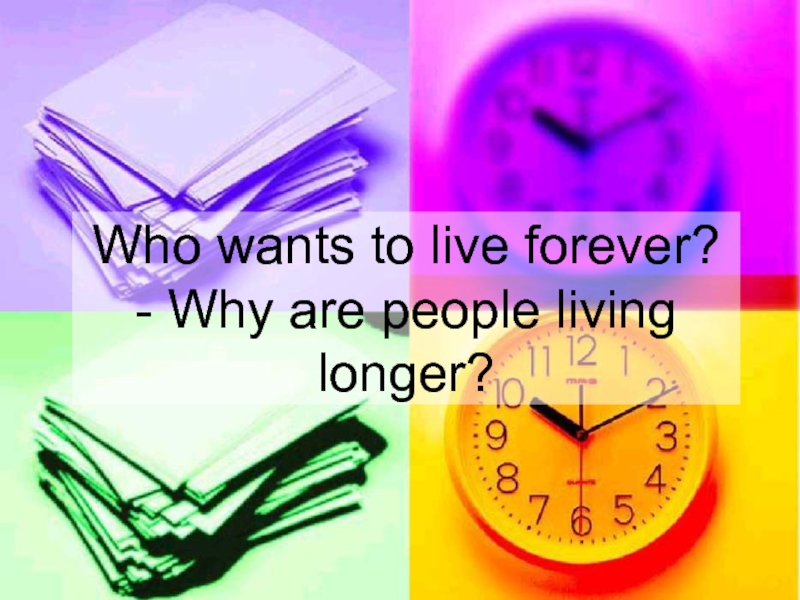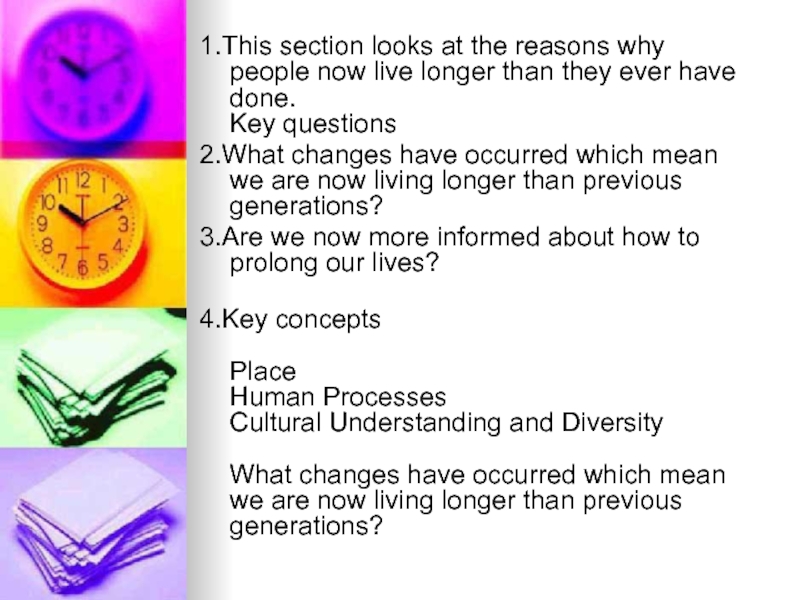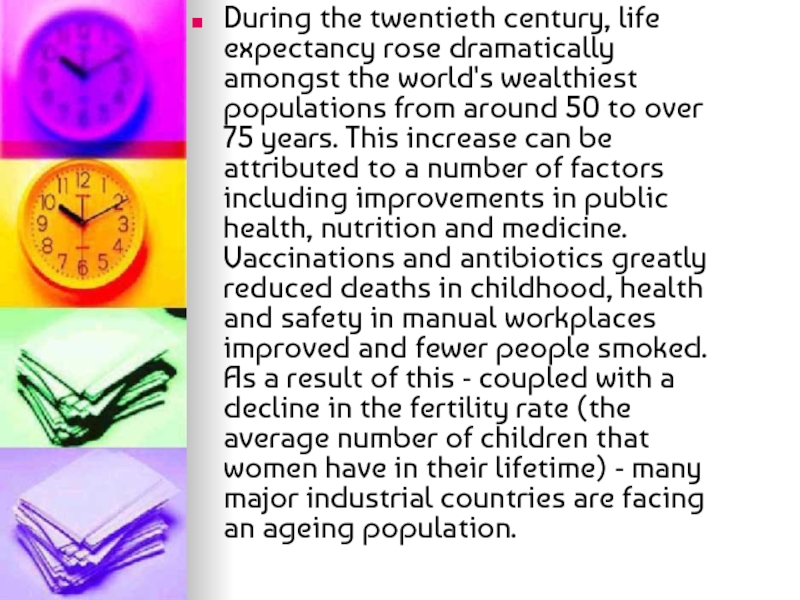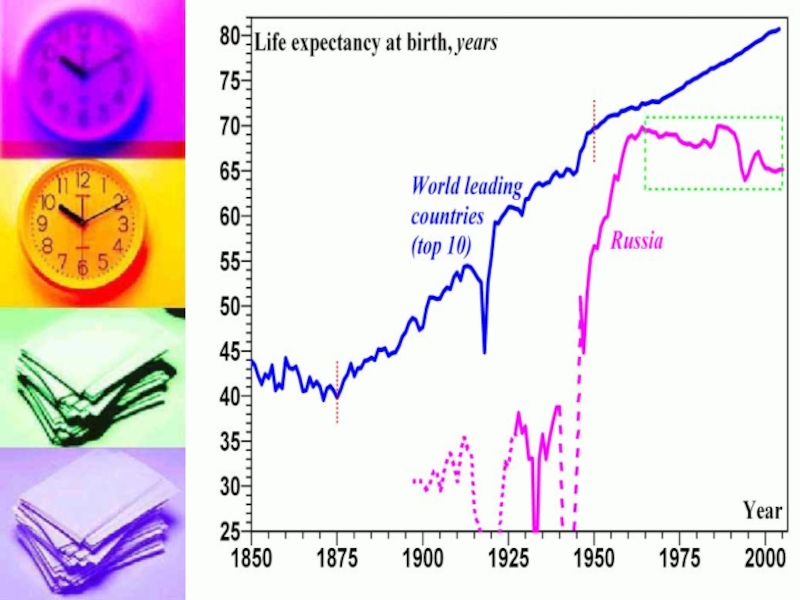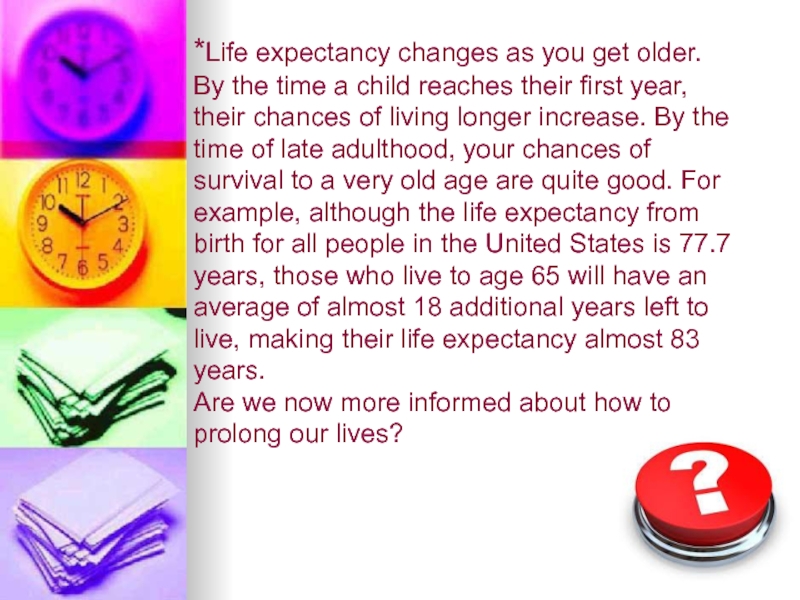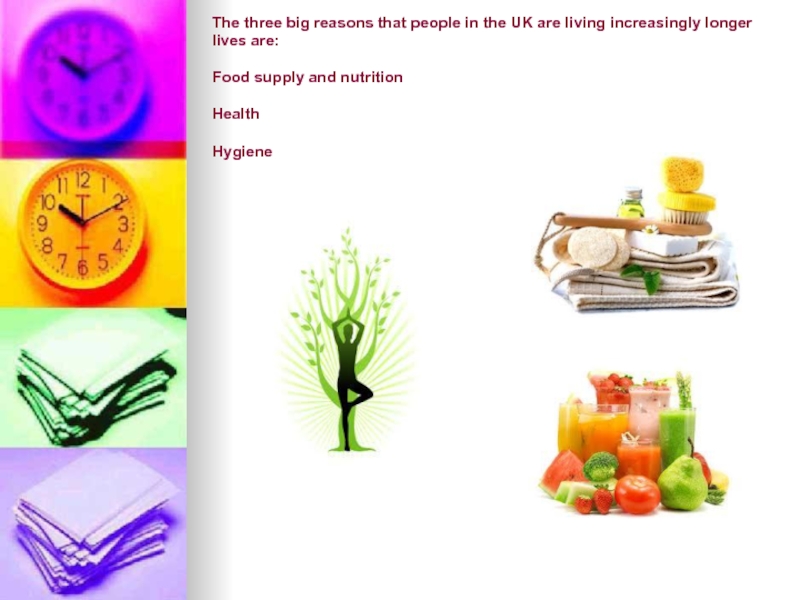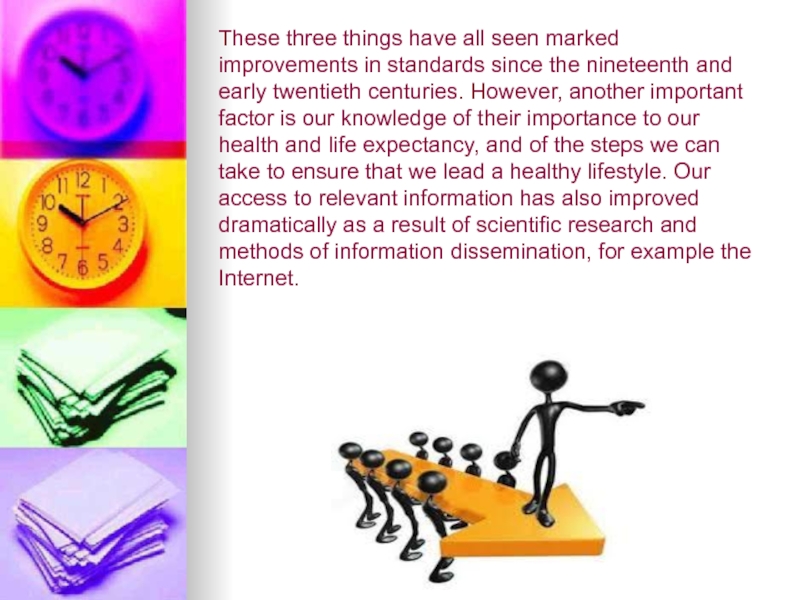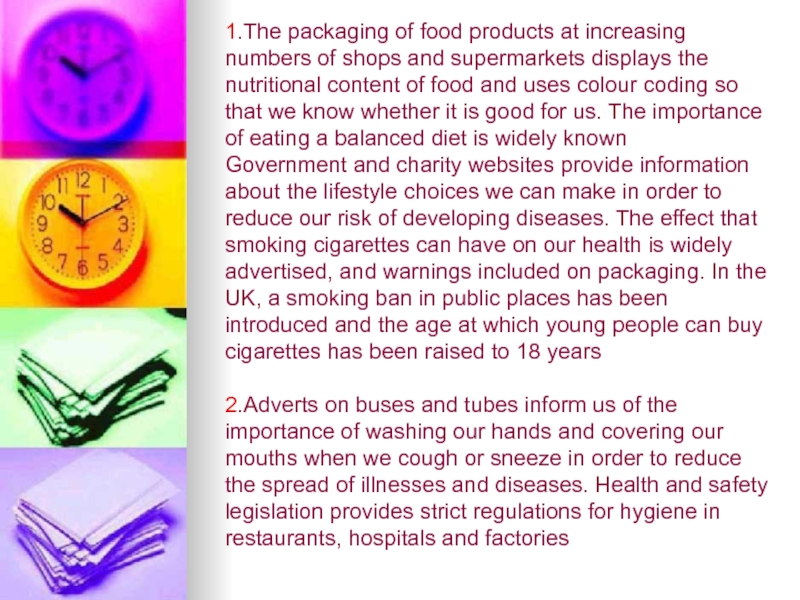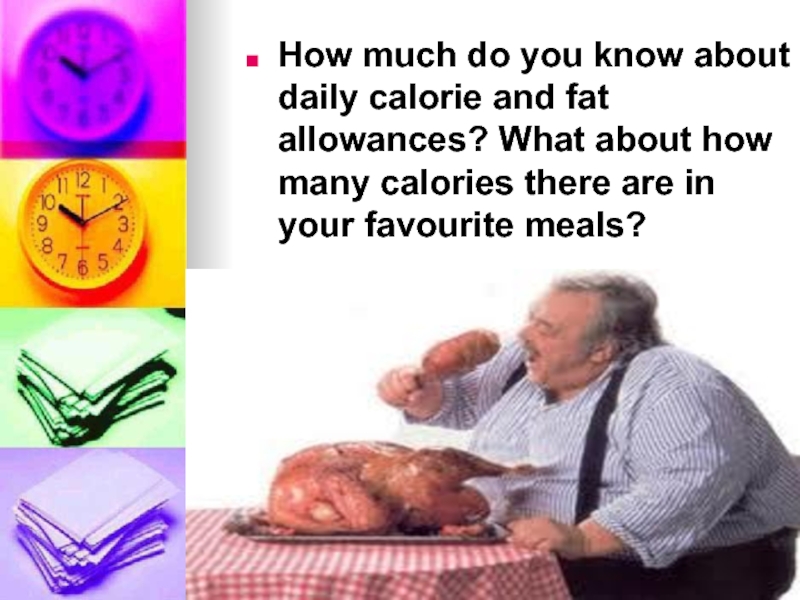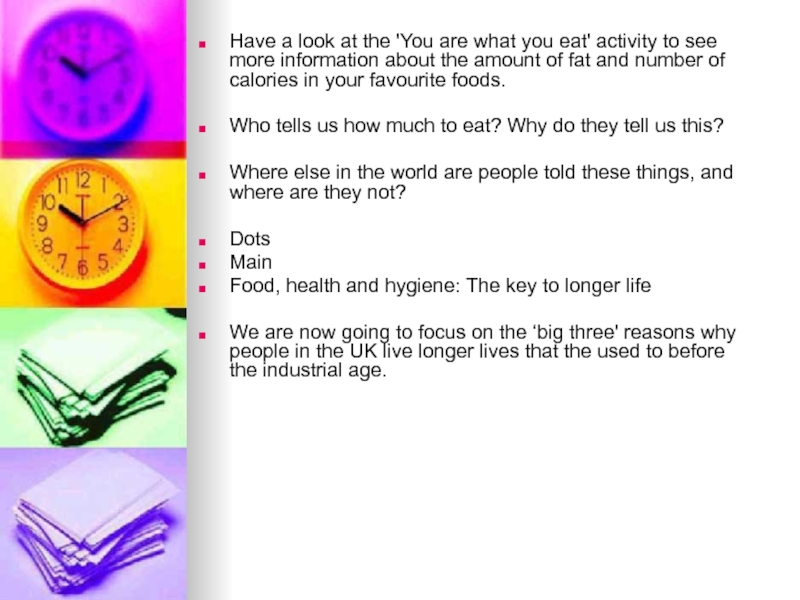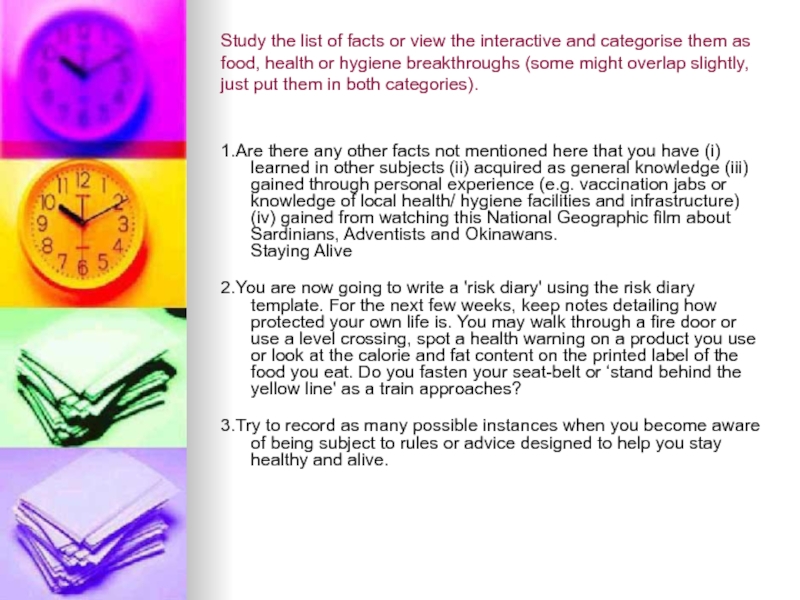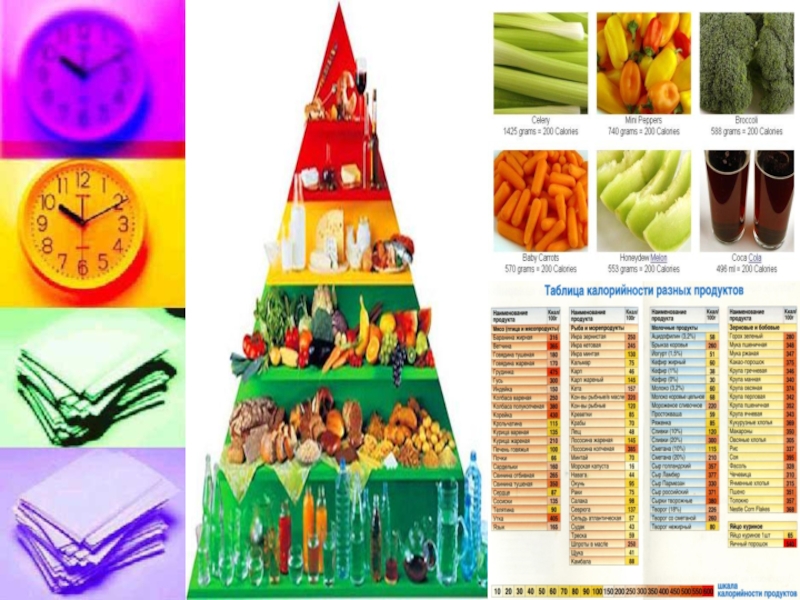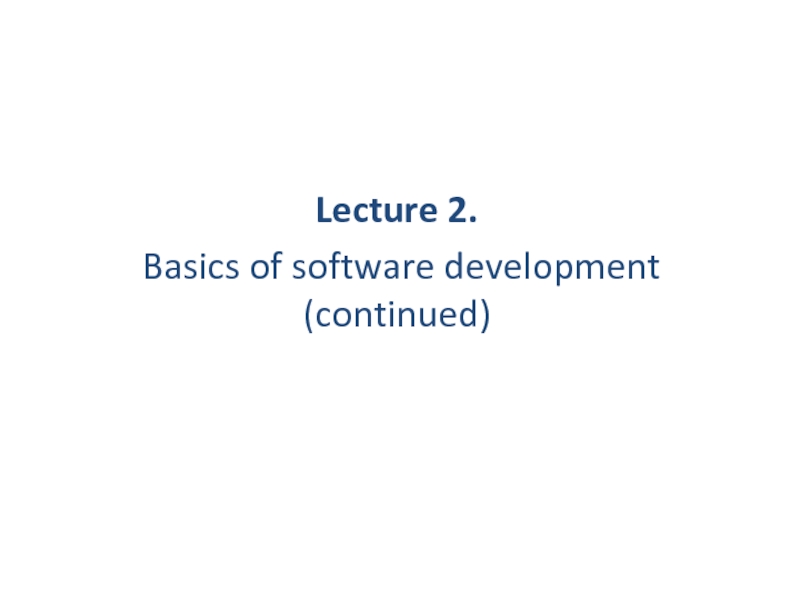Разделы презентаций
- Разное
- Английский язык
- Астрономия
- Алгебра
- Биология
- География
- Геометрия
- Детские презентации
- Информатика
- История
- Литература
- Математика
- Медицина
- Менеджмент
- Музыка
- МХК
- Немецкий язык
- ОБЖ
- Обществознание
- Окружающий мир
- Педагогика
- Русский язык
- Технология
- Физика
- Философия
- Химия
- Шаблоны, картинки для презентаций
- Экология
- Экономика
- Юриспруденция
Who wants to live forever? - Why are people living longer?
Содержание
- 1. Who wants to live forever? - Why are people living longer?
- 2. 1.This section looks at the reasons why
- 3. During the twentieth century, life expectancy rose
- 4. Слайд 4
- 5. *It is likely that life expectancy of
- 6. *Life expectancy changes as you get older.
- 7. The three big reasons that people in
- 8. These three things have all seen marked
- 9. 1.The packaging of food products at
- 10. How much do you know about daily
- 11. Have a look at the 'You are
- 12. Study the list of facts or view
- 13. Слайд 13
- 14. Слайд 14
- 15. Скачать презентанцию
Слайды и текст этой презентации
Слайд 2
1.This section looks at the reasons why people now live
longer than they ever have done.
Key questions
2.What changes have
occurred which mean we are now living longer than previous generations?3.Are we now more informed about how to prolong our lives?
4.Key concepts Place Human Processes Cultural Understanding and Diversity What changes have occurred which mean we are now living longer than previous generations?
Слайд 3During the twentieth century, life expectancy rose dramatically amongst the
world's wealthiest populations from around 50 to over 75 years.
This increase can be attributed to a number of factors including improvements in public health, nutrition and medicine. Vaccinations and antibiotics greatly reduced deaths in childhood, health and safety in manual workplaces improved and fewer people smoked. As a result of this - coupled with a decline in the fertility rate (the average number of children that women have in their lifetime) - many major industrial countries are facing an ageing population.Слайд 5*It is likely that life expectancy of the most developed
countries will continue to slowly advance and then reach a
peak in the range of the mid-80s. According to UN statistics for the period 2005 - 2010, Japan (82.6 years) has the world's highest life expectancy followed by Hong Kong (82.2 years) and Iceland (81.8 years). The world average is 67.2 years and the UK average is 79.4 years.Слайд 6*Life expectancy changes as you get older. By the time
a child reaches their first year, their chances of living
longer increase. By the time of late adulthood, your chances of survival to a very old age are quite good. For example, although the life expectancy from birth for all people in the United States is 77.7 years, those who live to age 65 will have an average of almost 18 additional years left to live, making their life expectancy almost 83 years. Are we now more informed about how to prolong our lives?Слайд 7The three big reasons that people in the UK are
living increasingly longer lives are:
Food supply and nutrition
Health
Hygiene
Слайд 8These three things have all seen marked improvements in standards
since the nineteenth and early twentieth centuries. However, another important
factor is our knowledge of their importance to our health and life expectancy, and of the steps we can take to ensure that we lead a healthy lifestyle. Our access to relevant information has also improved dramatically as a result of scientific research and methods of information dissemination, for example the Internet.Слайд 9 1.The packaging of food products at increasing numbers of shops
and supermarkets displays the nutritional content of food and uses
colour coding so that we know whether it is good for us. The importance of eating a balanced diet is widely known Government and charity websites provide information about the lifestyle choices we can make in order to reduce our risk of developing diseases. The effect that smoking cigarettes can have on our health is widely advertised, and warnings included on packaging. In the UK, a smoking ban in public places has been introduced and the age at which young people can buy cigarettes has been raised to 18 years 2.Adverts on buses and tubes inform us of the importance of washing our hands and covering our mouths when we cough or sneeze in order to reduce the spread of illnesses and diseases. Health and safety legislation provides strict regulations for hygiene in restaurants, hospitals and factoriesСлайд 10How much do you know about daily calorie and fat
allowances? What about how many calories there are in your
favourite meals?Слайд 11Have a look at the 'You are what you eat'
activity to see more information about the amount of fat
and number of calories in your favourite foods.Who tells us how much to eat? Why do they tell us this?
Where else in the world are people told these things, and where are they not?
Dots
Main
Food, health and hygiene: The key to longer life
We are now going to focus on the ‘big three' reasons why people in the UK live longer lives that the used to before the industrial age.
Слайд 12Study the list of facts or view the interactive and
categorise them as food, health or hygiene breakthroughs (some might
overlap slightly, just put them in both categories).1.Are there any other facts not mentioned here that you have (i) learned in other subjects (ii) acquired as general knowledge (iii) gained through personal experience (e.g. vaccination jabs or knowledge of local health/ hygiene facilities and infrastructure) (iv) gained from watching this National Geographic film about Sardinians, Adventists and Okinawans.
Staying Alive
2.You are now going to write a 'risk diary' using the risk diary template. For the next few weeks, keep notes detailing how protected your own life is. You may walk through a fire door or use a level crossing, spot a health warning on a product you use or look at the calorie and fat content on the printed label of the food you eat. Do you fasten your seat-belt or ‘stand behind the yellow line' as a train approaches?
3.Try to record as many possible instances when you become aware of being subject to rules or advice designed to help you stay healthy and alive.
